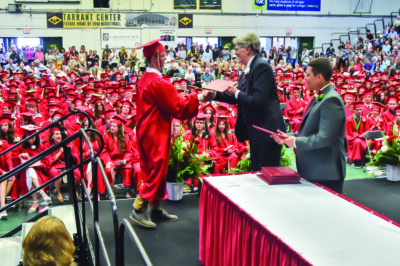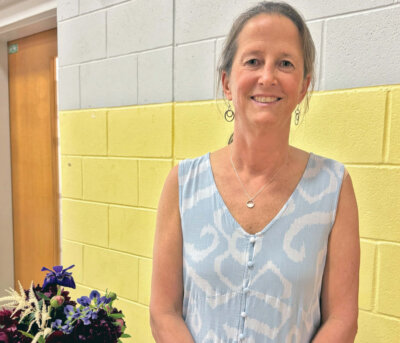CVSD revises budget with $4M less in expenditures
The Champlain Valley School District board’s meeting began on Tuesday, March 12, with Meghan Metzler of Charlotte being chosen unanimously as its next chair.
After the board took care of this and the other necessary requirements of reorganization after an election, it got down to the hard work — approving a new budget to send to voters in the district’s five towns to replace the proposed budget that was defeated on Town Meeting Day. This was a special meeting called specifically for that purpose.
The district was one of almost a third of the state’s school districts that defeated their proposed budgets. It was the first time voters in the CVSD had defeated a budget since consolidation created the Champlain Valley School District.
Charlotte had a record turnout for Town Meeting Day with 1,434 residents voting on the local ballot and 1,359 on the presidential primary, said town clerk Mary Mead.
According to this year’s town report, Charlotte had just over 3,300 registered voters in March 2023. With just over 3,900 residents, according to the 2020 census, it appears the town has an engaged electorate with almost 85 percent of its residents registered to vote, and almost 44 percent of those voting this time on local issues.
It is impossible to know how many of the town’s voters voted for or against the budget the school board had initially submitted because school ballots are all taken to the district to be tallied. There the ballots are mixed together, so that individual town votes won’t be revealed.
The presentation of the CVSD administration’s proposals for a revised budget began with Superintendent Rene Sanchez saying the staff had worked to come up with new budget proposals for the board consideration that would lower the tax rate with the least impact on students.
Gary Marckres, the district’s chief operation officer, applauded his coworkers’ help in getting these budget proposals ready in such a short time, since the vote rejecting the initial budget had just been the week before.
Sanchez said the goal was to have the board approve a new budget proposal ready to go to voters on April 16.
One of the options Marckres presented will result in the district removing 41 full-time equivalent positions from the rejected 2024 budget. The positions that would be cut under this plan would be seven district and central office positions, 19 paraprofessional positions, 16 teaching positions and “$380,000 in non-personnel spending.”
Non-personnel spending is for things like supplies, IT hardware and software, and equipment.
It was noted at the meeting that the 16 teaching positions eliminated by this option would not necessarily be 16 classroom teachers. It could be a mixture of roles that would add up to that number. These would be positions that were acquired with Elementary and Secondary School Emergency Relief (ESSER) funds. This is federal money given to schools to help stimulate COVID recovery. Marckres said all ESSER funding has ended.
Another budget option he offered for the board to consider would have kept all the reductions called for in the previous budget proposal, but would have also called for $500,000 more in cuts to be found in the school system’s budget and another $500,000 to bring down the budget by applying that amount from the district’s fund balance.
The first option suggested at the meeting, without the more stringent cuts, was eventually approved by the school board with a 7-4 vote with one abstention. This is the budget the school system will send to voters. If approved by voters, it will mean a budget with a bit over $101.8 million in expenditures for fiscal year 2024-25.
The budget voters defeated called for expenditures of just over $105.8 million, so the new budget is a $4 million decrease in proposed spending.
The expenditures in the 2023-24 budget were $96 million.
This new proposed budget calls for a Charlotte tax rate of $1.27. If approved, it would mean property valued at $500,000 will get a school tax bill of about $6,350 this year. This is a property tax increase of 17 percent over the fiscal year 2023-24 budget’s tax rate of $1.09.
The failed budget called for Charlotte’s tax rate to go up to $1.40. This would have meant a 28-percent increase in school taxes, and for property valued at $500,000 to get a bill of about $7,000.
Sanchez confirmed that, if the board had chosen the additional $500,000 in budget cuts called for by the more severe budget cutting option, which the board didn’t approve to send to voters, much of that money would have had to come from cutting more full-time equivalent positions. He said, although educators would work to provide services to children at the same level as now, they likely would not be able to.
Under this new proposed budget, spending at Charlotte Central School was reduced from the initial budget by $144,000. Cuts to Champlain Valley Union High’s initially proposed budget were $612,000. The district and operations budget was cut by $776,000, Hinesburg Community School by $226,000, Williston Central School by $413,000 and Shelburne Community School by $317,000.
These reductions were equity based, based on the “weighted pupils” at each of the districts’ schools, Marckres said. “Weighted pupils” is a student funding model based on the number of students at a school, with extra dollars allocated per student that needs services like special education, English-as-a-second language instruction or help catching up to grade level.
“The commissioner of taxes in Vermont estimated that the education spending growth in Vermont statewide would average around 12 percent,” Marckres said. The proposed budget the board approved makes this around 2 percent.
“I’m saying that we’re pretty far below the statewide estimated increase,” he said.
Related Stories
Popular Stories
If you enjoy The Charlotte News, please consider making a donation. Your gift will help us produce more stories like this. The majority of our budget comes from charitable contributions. Your gift helps sustain The Charlotte News, keeping it a free service for everyone in town. Thank you.
Andrew Zehner, Board Chair









